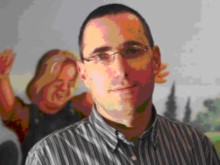
With a vision of countering the disempowerment of disabled individuals and catalyzing political change, Dr. Ariel Tenenbaum, head of the Hadassah Medical Organization’s Down Syndrome Center, will be teaching Israel’s first university graduate course in disability studies.
The course, which will initially be offered to students of occupational therapy and social work, will demystify how so-called “disabled” individuals are treated collectively in a way that diminishes their interpersonal, economic, and physical well-being. “I hope that in time it will be open to medical and dental students and that eventually a full Master’s and PhD program will be developed,” Dr. Tenenbaum relates.
A joint program launched by the Hadassah-Hebrew University School of Medicine and the Hebrew University, the course will be taught at the Mount Scopus campus of Hebrew University. Students will simultaneously enhance their studies with an internship at the Hadassah Medical Center with Dr. Tenenbaum and his colleagues to gain a close-up understanding of the personal and societal challenges faced by the disabled.
Dr. Tenenbaum’s hands-on experience and research have taught him that you can’t look at a person only for his problems in one medical area. “We professionals must talk to each other to understand the various aspects of the person’s disease and his overall day-to-day situation to help the best way we can.” Consequently, Dr. Tenenbaum and his colleagues bring an interdisciplinary perspective, joining the forces of medicine, humanities, and social studies in a collaborative approach to Hadassah’s patients.
Dr. Tenenbaum also works in collaboration with the Ministry of Social Affairs in evaluating children who are up for adoption. “Many of these children have psychological, social or medical problems, such as Fetal alcohol spectrum disorder, which is caused by a mother drinking alcohol during pregnancy,” Dr. Tenenbaum says.
Last year, Dr. Tenenbaum opened an additional clinic in a joint effort with the Hebrew University Faculty of Law. Here, children with various disabilities and their families can meet with a lawyer who ensures that the patient is being allotted all warranted government aid and allowed all the rights he or she deserves. By working at the clinic, students of law are exposed to real, every-day situations and gain experience helping patients to maximize the services they receive. Eventually, Dr. Tenenbaum hopes to involve the medical students of the Hebrew University as well–not only because they are familiar with the various medical terms and disabilities involved, but also because working at the clinic will educate them about the economic and legal aspects of the disease.
In Dr. Tenenbaum’s words, “Our overall goal in all of this is to improve the lives of kids with disabilities and the lives of their families, ensuring they get everything they deserve.”
